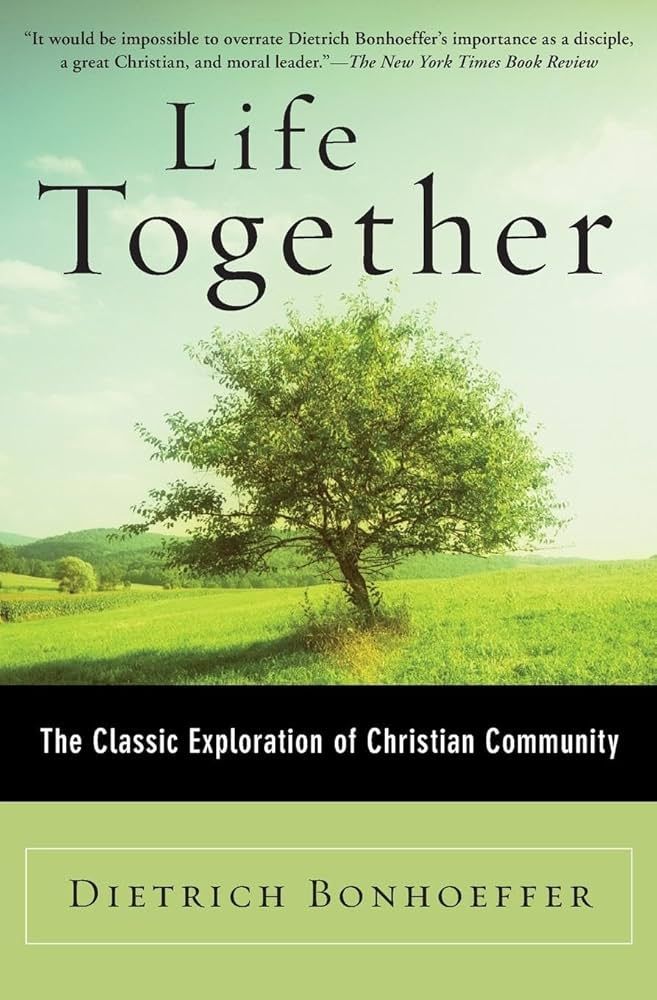The 2024-2025 One Book
Life Together
by Dietrich Bonhoeffer
It is grace, nothing but grace,
that we are allowed to live in community
with Christian kin.
In our Baptismal liturgy, the Celebrant and People welcome the newly baptized with these words: "We receive you into the household of God. Confess the faith of Christ crucified, proclaim his resurrection, and share with us in his eternal priesthood" (BCP, p. 308). What is this household of God? What is this eternal priesthood? What if "church" means more than just "going to" a service? What if we are summoned to "be" Church, to live as the Church? What if Christian community is really a whole way of life together? What if Christian community is more than a nice idea; what if it is a way of making Christ real in the world?
These are the questions that returned to Dietrich Bonhoeffer time and again, most succinctly and directly in his little book, Life Together. Today, especially in the political climate of our times, we find ourselves constantly bombarded with messages of mutual suspicion, division, and disaffection. It infects even the most well-meaning communities. We need a voice that will help us reclaim the heart of Christian community, that we might remember our greater loyalty to Christ and to one another. I hope you will join me this year in letting Bonhoeffer's little book challenge and move you. I hope that we will be able to struggle with Bonhoeffer, and maybe just find new life in this community of ours, in this life together.
Get the book:
Please note: There are two good English translations. The links above are for the 1954 translation by John Doberstein. The 1996 translation by Daniel Bloesch is also quite good, and opts for a translation whose language is more gender-inclusive.
Embolden our lives, O Lord, and inspire our faiths, that we, following the example of your servant Dietrich Bonhoeffer, might embrace your call with undivided hearts; through Jesus Christ our Savior, who lives and reigns with you and the Holy Spirit, one God, for ever and ever. Amen.
(Lesser Feasts and Fasts)
Dietrich Bonhoeffer (1906-1945)
Dietrich Bonhoeffer (1906-1945) was a German pastor and theologian. He is perhaps best known for his resistance to the Nazi regime, for which he was executed on April 9, 1945, just weeks before the end of the war. His theology and his sense of the church and Christian community were forged out of this struggle to be Christian in a decidedly un-Christian (or maybe even anti-Christian) age.
The question of Christian community insistently returned to Bonhoeffer throughout his regrettably brief but brilliant career. In an early work he wrote that the community of Christians "is based upon and is kindled in their mutual love. The surrender themselves to each other and to God and thereby form a community both with one another and with God. ...[T]he experience of the 'religious' community is now really the experience of the church and the collective person of the church really is 'Christ existing as community.'"
This experience of the community of faith as Christ's existence in the world was further stretched and molded by his leadership of an underground seminary (1935-1937). In that small community, Bonhoeffer grew in his understanding of what it meant to be Christ in the world. He wrote Life Together shortly after the seminary was shut down by the Gestapo in 1937.
Bonhoeffer was acutely aware of the difficulties of life in community, and the easy disillusionment that could come when the experience did not live up to the imagined idea. Yet he also wrote eloquently of the gift and privilege of Christian community. “It is not simply to be taken for granted that the Christian has the privilege of living among other Christians. Jesus Christ lived in the midst of his enemies. At the end all of his disciples deserted him. On the Cross he was utterly alone, surrounded by evildoers and mockers. For this cause he had come, to bring peace to the enemies of God. So the Christian,
too, belongs not in the seclusion of a cloistered life but in the thick of foes. There is his commission, his work . . . So between the death of Christ and the Last Day it is only by a gracious anticipation of the last things that Christians are privileged to live in visible fellowship with other Christians.”
Bonhoeffer was arrested April 5, 1943, and imprisoned in Berlin. After an attempt on Hitler’s life failed on July 20, 1944, documents were discovered linking Bonhoeffer to the conspiracy. He was taken to Buchenwald concentration camp, then to Schoenberg Prison. On Sunday, April 8, 1945, just as he concluded a service in a school building in Schoenberg, two men came in with the chilling summons, “Prisoner Bonhoeffer . . . come with us.” He said to another prisoner, “This is the end. For me, the beginning of life.” Bonhoeffer was hanged the next day, April 9, at Flossenburg Prison.
There is in Bonhoeffer’s life a remarkable unity of faith, prayer, writing, and action. Discipleship was to be had only at great cost.

